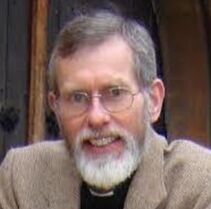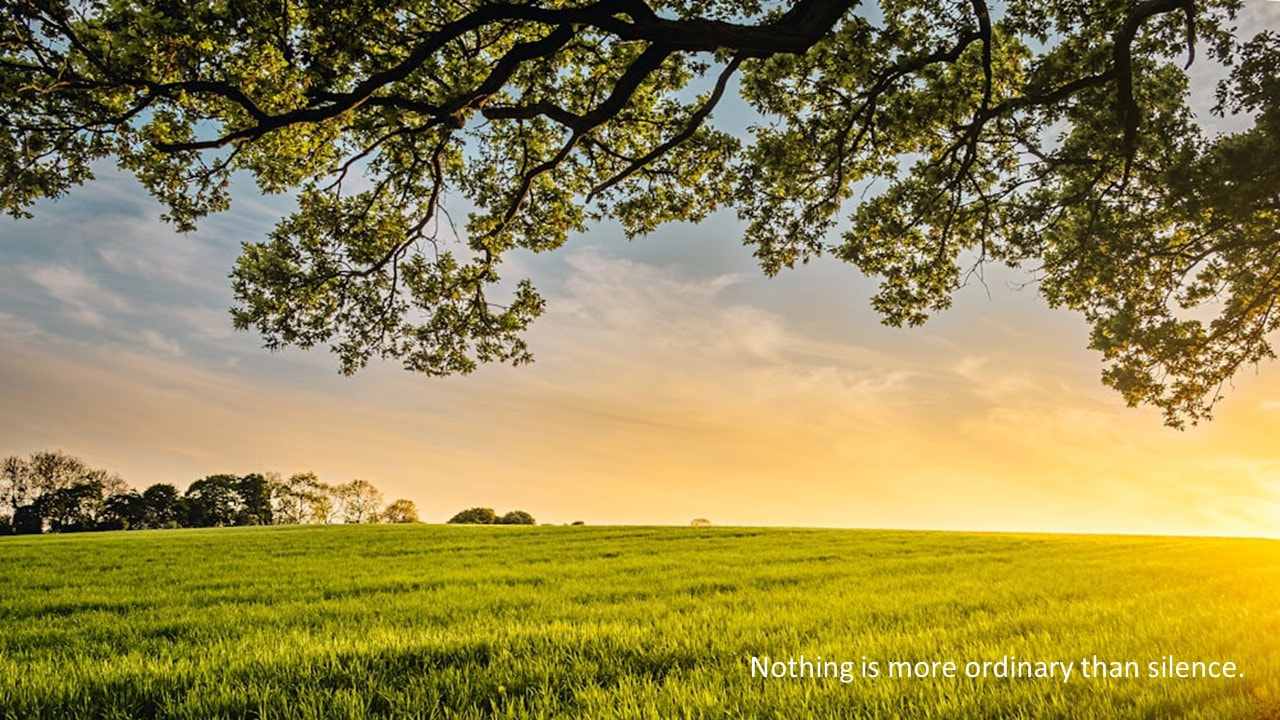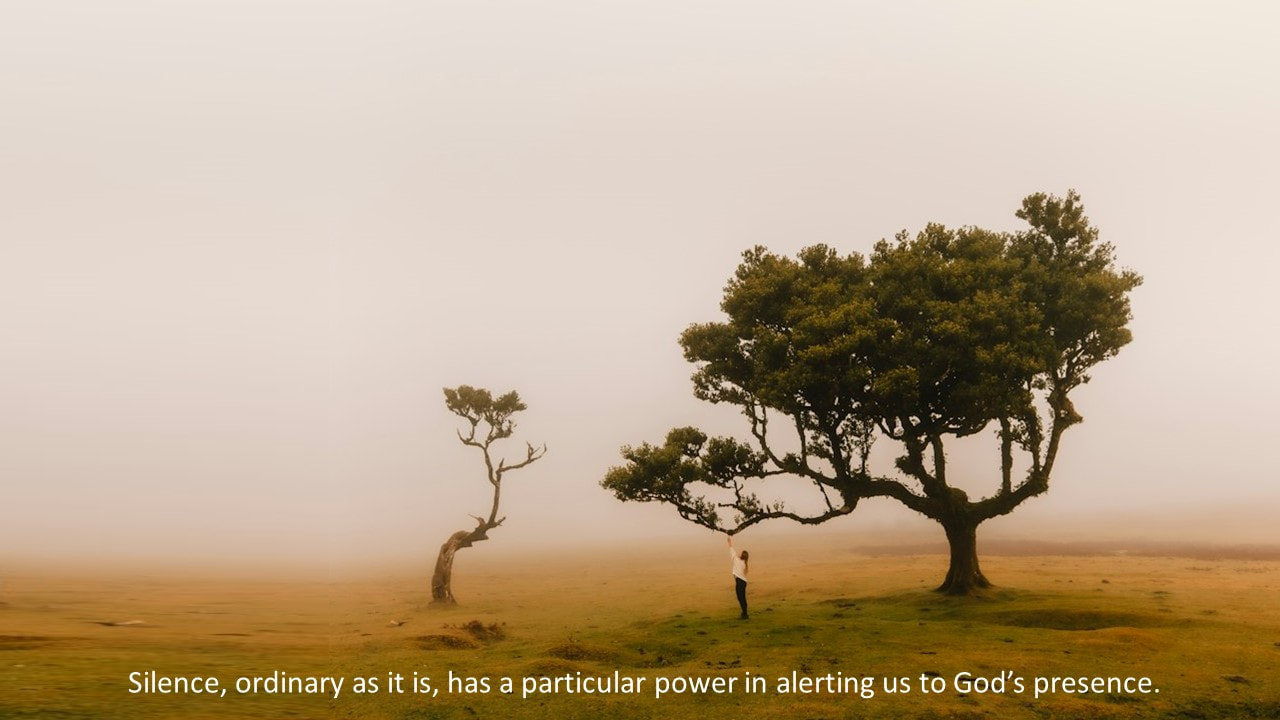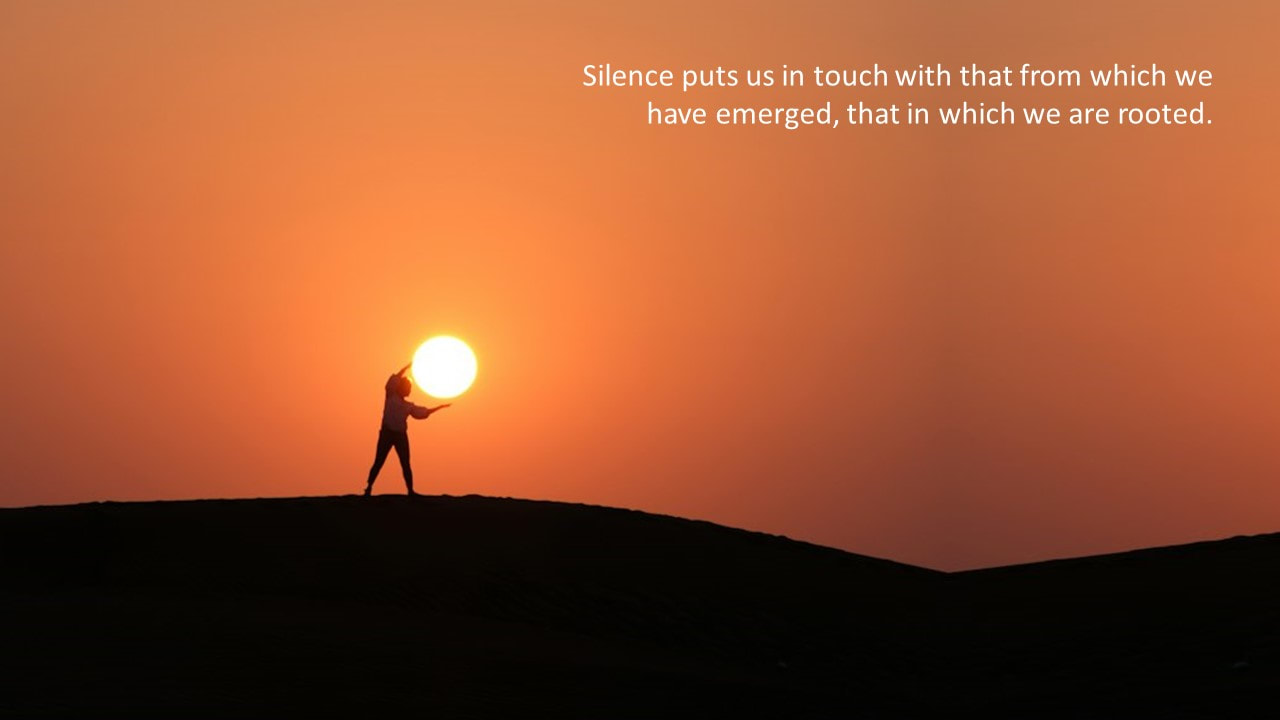The first week of each month has a short, image-backed quote with links to associated resources in the text below it. In other weeks, the short quote is taken from a longer one by the month's author, found below the image. The last week of the month has a short quote and questions to encourage reflection on all the month's quotations and images.
Andrew Norman, our author for April, was born in 1954 and ordained priest in the Church of England in 1979.
As his book is out of print there is no information about it in online bookstores. However, you can see the striking front cover and read the information on the back of Andrew Norman's book, Silence in God (SPCK, 1990), from which this month's quotes are taken, by clicking here.
As his book is out of print there is no information about it in online bookstores. However, you can see the striking front cover and read the information on the back of Andrew Norman's book, Silence in God (SPCK, 1990), from which this month's quotes are taken, by clicking here.
|
Guided Meditation to use with short and long quotes:
For a 5 minute audio guided meditation to use with each week's quote, click the play button on the image. To pause, and restart, click in the same place. To see the image full screen as you listen, click the expand screen icon in the corner. |
|
|
Lectio Divina to use with longer quotes:
For an audio guided Lectio Divina to use with this week's longer quote, click the play button on the image. Allow 10-15 minutes for this practice. To pause, and restart, click in the same place. For a text version of the Lectio Divina meditation, click the button. |
|
Monday 1st April, 2024
Andrew Norman, Silence in God (SPCK, 1990), 20.
Image: Benjamin Davies, Brighton, Unsplash.com/@bendavisual
It makes a delightful change that, for the first time, our bio about this month's book has kindly been written for us by its author, Revd Dr Andrew Norman. (N.B. He is not to be confused with a different Dr Andrew Norman who writes historical biographies and whose profile many booksellers erroneously link to this month's book!)
Andrew writes:
'My appreciation of silence comes, I think, from being a 'quiet' person. My rather introverted nature means that I feel most balanced in environments that are not over-stimulating the senses.
I discovered contemplative silence in the Christian tradition at theological college (King's College, London and St Stephen's House, Oxford) during formation for the priesthood. Every morning we were required to be present for Morning Prayer and Mass with a period of silence for meditation. I read Thomas Merton's Seven Storey Mountain (Harcourt Brace, 1948) - see here - and felt drawn by his hunger for experiencing the divine presence in prayerful stillness. I made occasional retreats with the Anglican Benedictine community then at Nashdom in Berkshire. I remember waking one summer night and hearing the voices of the monks as they chanted the psalms of the night office coming to me through the trees and the quiescence it made me feel (for some history of the Abbey, see here).
After ordination as deacon in Canterbury cathedral in 1978, then serving as curate in Deal and then Maidstone, I found myself Vicar of St Michaels Tenterden. Here, spotting the opportunity before we began a family, I was able to complete a PhD thesis exploring epistemological issues which arise from the claim that we can know God in silence. This required me to engage with some heavy philosophy, but also to reflect on my own regular practice. With the encouragement of my supervisor, Dr Grace Jantzen, I then published some of the fruits of that work in my book, Silence in God (SPCK, 1990). This was followed by a booklet published by the Sisters of the Love of God, Oxford, Learn to be at Peace (Fairacres Press, 2010), written while recovering from a brain haemorrhage (see here).
In 1993 I had been appointed to be Rector of St Nicolas' Guildford where the following twenty-seven years were spent very happily immersed in parish ministry. Preparing to retire I felt called to train to qualify as a counsellor. Fortunately the course finished just before Covid, we moved to Sidmouth on the south Devon coast, and here I now continue a listening ministry in which contemplative silence is the deepest - and most implicit - stratum. I try to centre myself on the example of Julian of Norwich as I live now in my own 'cell' and in this being a Companion of Julian is a constant encouragement (see here).'
Fr Andrew Norman CJN
You can read an interview with Andrew in a Guildford newspaper from June 2017, here.
You can also read a section of his pamphlet, Learn to be at Peace, which was published in The Church Times in 2010, as 'The Gift of Silence', here.
Andrew writes:
'My appreciation of silence comes, I think, from being a 'quiet' person. My rather introverted nature means that I feel most balanced in environments that are not over-stimulating the senses.
I discovered contemplative silence in the Christian tradition at theological college (King's College, London and St Stephen's House, Oxford) during formation for the priesthood. Every morning we were required to be present for Morning Prayer and Mass with a period of silence for meditation. I read Thomas Merton's Seven Storey Mountain (Harcourt Brace, 1948) - see here - and felt drawn by his hunger for experiencing the divine presence in prayerful stillness. I made occasional retreats with the Anglican Benedictine community then at Nashdom in Berkshire. I remember waking one summer night and hearing the voices of the monks as they chanted the psalms of the night office coming to me through the trees and the quiescence it made me feel (for some history of the Abbey, see here).
After ordination as deacon in Canterbury cathedral in 1978, then serving as curate in Deal and then Maidstone, I found myself Vicar of St Michaels Tenterden. Here, spotting the opportunity before we began a family, I was able to complete a PhD thesis exploring epistemological issues which arise from the claim that we can know God in silence. This required me to engage with some heavy philosophy, but also to reflect on my own regular practice. With the encouragement of my supervisor, Dr Grace Jantzen, I then published some of the fruits of that work in my book, Silence in God (SPCK, 1990). This was followed by a booklet published by the Sisters of the Love of God, Oxford, Learn to be at Peace (Fairacres Press, 2010), written while recovering from a brain haemorrhage (see here).
In 1993 I had been appointed to be Rector of St Nicolas' Guildford where the following twenty-seven years were spent very happily immersed in parish ministry. Preparing to retire I felt called to train to qualify as a counsellor. Fortunately the course finished just before Covid, we moved to Sidmouth on the south Devon coast, and here I now continue a listening ministry in which contemplative silence is the deepest - and most implicit - stratum. I try to centre myself on the example of Julian of Norwich as I live now in my own 'cell' and in this being a Companion of Julian is a constant encouragement (see here).'
Fr Andrew Norman CJN
You can read an interview with Andrew in a Guildford newspaper from June 2017, here.
You can also read a section of his pamphlet, Learn to be at Peace, which was published in The Church Times in 2010, as 'The Gift of Silence', here.
Monday 8th April, 2024
Andrew Norman, Silence in God (SPCK, 1990), 21.
Image: Charles Forerunner, unsplash.com/@charles_forerunner
The short, image-backed quote, above, is taken from this week's longer quote, below, on pages 21 and 22 of Andrew Norman's book. To read more about his book, from which this month's quotes are taken, click here.
|
Listen to this week's longer quote:
To listen to the longer quote, below, being read, click the play button on the small version of the image next to or below this text. To see the image full screen as you listen, click the expand screen icon in the corner. |
|
'Plain ordinary silence sometimes becomes the means for an extraordinary experience. … various types of silence meditate the presence of God, and in such a way that we cannot separate God from the medium of God’s disclosure to us. The definition of a sacrament can be used to explain this silence. The datum consists of a lack of noise, thought, or speech; this is the outward and visible sign. The meaning of this datum is the sense of God’s presence; this is the inward and spiritual grace. However we become silent – whether it be through entering an empty church, or as an inner stilling of the mind; whether it represents our human inadequacy faced with the mystery of the concept of ‘God’, or as a sense of the ubiquitous involvement of God everywhere – the data point sacramentally beyond themselves. …
Our day-to-day lives are lived in the context of the eternal. Much of the time we may be unaware of the greater reality – even if our own limited sphere would be meaningless without it. But, just occasionally, and perhaps for some people more than others, the eternal shines through the ordinary. The monotony of the mundane is shot through with a ray of light from its all-encompassing Mystery. This is the sacramental significance that silence may come to have. The very ordinary suddenly reveals the extraordinary.'
Monday 15th April, 2024
Andrew Norman, Silence in God (SPCK, 1990), 34.
Image: Daniel Schwarz, unsplash.com/@danieljschwarz
The short, image-backed quote, above, is taken from this week's longer quote, below, on pages 33-34 of Andrew Norman's book. To read more about his book, from which this month's quotes are taken, click here.
|
Listen to this week's longer quote:
To listen to the longer quote, below, being read, click the play button on the small version of the image next to or below this text. To see the image full screen as you listen, click the expand screen icon in the corner. |
|
'Silence … connects easily with a sense of presence; it is an appropriate sign that may then sacramentally mediate the holy presence of God. But silence also connects easily with a sense of meaninglessness. It reminds us of what are perhaps our deepest anxieties – the terror of utter chaos, the fear that there can be no meaning, our fundamental alienation from the possibility of ultimate fulfilment. It is no wonder that in the practice of silent prayer one typically comes to the point at which it seems profoundly repellent. …
Such feelings may offer part of an explanation for the frenetic pace of modern life. We use our constant activity as a means to avoid contemplating the underlying meaninglessness. Perhaps, though, there is a more subtle and reciprocal link between our frenzied activism with its rapacious consumerism and our fear of chaos. The psychologist C. G. Jung wrote, "Restlessness begets meaninglessness, and the lack of meaning in life is a soul-sickness whose full extent and full import our age has not as yet begun to comprehend."* Perhaps, then, this begins to reveal the importance of silent contemplation in our angst-ridden age? It may be that the fear of chaos needs to be faced squarely and not continually evaded. The keeping of silence would certainly be an effective means for breaking through the vicious cycle of restlessness which begets meaninglessness which begets restlessness.
It must be accepted, then, that silence entered into will necessarily have an ambivalent, bitter-sweet quality. Silence is merely a feature of our workaday world. We may not particularly seek it out – by, for example, deliberately waking in the middle of the night as some contemplative religious orders still do. But if we do we may discover that silence, ordinary as it is, has a particular power in alerting us to God’s presence. … such moments of Divine disclosure will always be set in the midst of long stretches when the silence seems remorselessly dull and mundane. … More disturbingly, silence may also alert us to deep feelings of alienation and a profound fear of chaos. The highest moments of religious ecstasy cannot be separated from corresponding moments of human despair.’
* Carl G. Jung, The Structure of the Dynamics of the Psyche (Routledge & Kegan Paul, 1969), 815.
Monday 22nd April, 2024
Andrew Norman, Silence in God (SPCK, 1990), 123.
Image: Selvan B, unsplash.com/@selvan548
The short, image-backed quote, above, is taken from this week's longer quote, below, on pages 123-124 of Andrew Norman's book. To read more about his book, from which this month's quotes are taken, click here.
|
Listen to this week's longer quote:
To listen to the longer quote, below, being read, click the play button on the small version of the image next to or below this text. To see the image full screen as you listen, click the expand screen icon in the corner. |
|
'Silence is a primordial quality. Scientists speculate that before the big bang that marked the beginning of the universe, there existed a centre of intense mass and energy. Our minds imagine a surrounding environment of utter emptiness. Christian thinkers have reasoned even more fundamentally that God created the world ex nihilo, out of nothing. Thus "older than the mountains" must be the silence of the primordial nihilo. Both the scientist and the theologian might say that we, and the whole natural world, have emerged out of silence. Others will continue – though not the Christian – by saying that in death we return to a total silence. But to us all the underlying existence of this primordial nihilo may seem frightening, threatening to crush our fragile human forms. Nevertheless, I have tried to suggest that silence is actually a medium in which we may come to experience God. But in doing this I have not wanted to pretend that silence is always comfortable and positive. It seems to me that often it is frightening. Silence has an unknown depth. The apparent loss of form and language easily makes us panic, for our feet can no longer feel the bottom, and we fear that we will drown in a gulf of meaninglessness. It is not surprising that we instinctively tend to cover our silence and hide from it. However, if God can be described as the ground of our being, it may be in silence that we are able to come closest to that primordial source of all life.
So it is that we may find silence to have a purity, a special transparency of God, which is simply self-diminishing for us to deny. Silence allows us access to a form of experience which, far from being merely an esoteric concern for the mystically inclined, is fundamental to what it means to be human. Silence puts us in touch with that from which we have emerged, that in which (however unknowingly) we are rooted.'
Monday 29th April, 2024
Andrew Norman, Silence in God (SPCK, 1990), 126.
Image: Alexander Milo, Edmonton, Canada, unsplash.com/@lexmilo
The last week of each month offers some questions to help you reflect further on its quotations and images, and how they resonate with your own spiritual journey and relationship with God.
You can engage with these using the written text or the audio version of the questions, below.
The last week of each month offers some questions to help you reflect further on its quotations and images, and how they resonate with your own spiritual journey and relationship with God.
You can engage with these using the written text or the audio version of the questions, below.
|
Listen to the reflection questions:
To listen to the reflection questions, below, being read, click the play button on the 'Reflect ...' image next to or below this text. To see the image full screen as you listen, click the expand screen icon in the corner. |
|
Reflection questions:
Before reflecting on this month's quotes and images, take time to re-ground yourself in your body.
Perhaps take a few slow breaths, feel your feet on the floor and be aware of how your body feels in this moment.
1) Read back over or listen again to this month's quotes and spend time looking at their associated images. As you do so, note a phrase or image that draws your attention. If this is a phrase, you might like to write this out in a journal or on a piece of paper where you will see it regularly. Consider reading aloud several times what you have written to help the words sink more deeply into your heart. If an image resonates with you, let your gaze rest lightly on it for a couple of minutes, allowing it to speak to your heart. Consider using it as a screensaver for a while, or perhaps print it out and place it somewhere that you will see it often.
2) What emerges as you sit with the phrase or image that attracted your attention? Does a new insight or a question, emotion or sensation arise? Take some time to write down and ponder on whatever you notice.
3) Where can you see hope in the midst of what is emerging in you, for yourself, your neighbour, your community, or the planet? How might this impact your daily life and those with whom you share it?
4) In the days and weeks to come, how can you stay open to what you have discovered from your reflections?
Take some time to give thanks for the hope that you have found in this month's quotes and images.
|
To request the weekly 'Quoting Silence: A month with ...' emails each Monday, with links to the month's author page on the website, click this button.
|
|
To return to the 'Quoting Silence: A month with ...' Collection, click this button.
|






